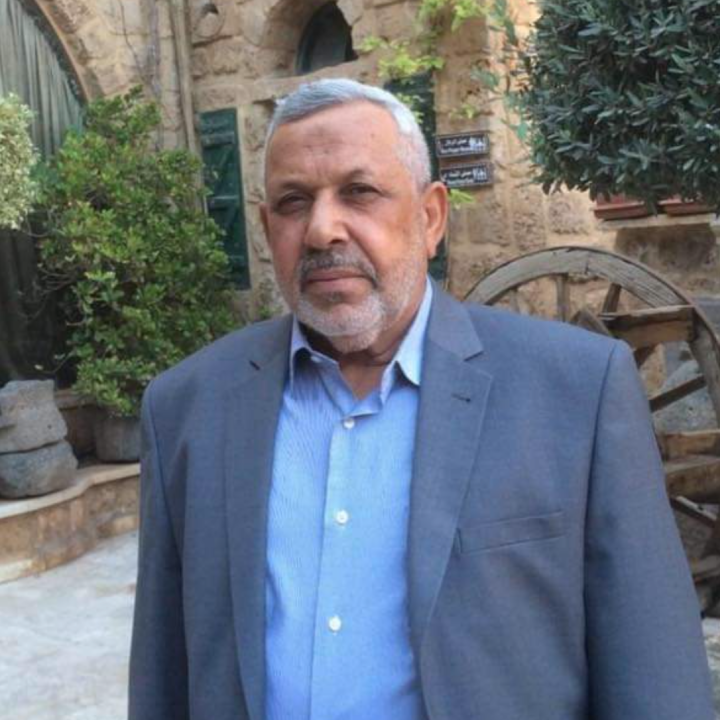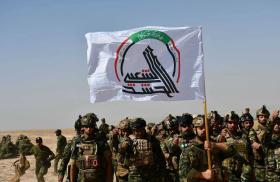
Kataib Hezbollah and the Gaza Crisis (Part 1): Special Ops in the Lead

The group's earliest reactions to the war were led by its Special Operations wing under Abu Hussein and two spokesmen from his camp.
Ever since Abu Mahdi al-Muhandis, the founder of Iran-backed Iraqi militia Kataib Hezbollah (KH), was killed in a U.S. airstrike in January 2020, different characters within the group have been trying to fill the vacuum he left or at least gain influence in the muqawama (resistance) scene. In the context of the Hamas-Israel war that broke out last month, this situation has resulted in KH speaking with a bewildering number of voices, underlining how its top echelon is still a relatively flat, non-hierarchical brotherhood—with all the rivalries and role division one would typically expect between "siblings."
Since the Gaza war erupted, every major muqawama faction in Iraq has issued statements on the crisis, and KH was not the first. The initial commentator was Asaib Ahl al-Haq’s Qais al-Khazali, who addressed the situation immediately on October 7, underlining his eagerness to jump on any important development and demonstrate his independence before his patrons in Tehran established a “party line” for all groups to follow. Other factions, including KH, waited longer before commenting—first Harakat Hezbollah al-Nujaba on October 9, then the Badr Organization and KH a day later.
Abu Hussein Gives KH's First Statement
The militia's first public statement came from KH's secretary-general and head of its Special Operations division, Ahmad Mohsen Faraj al-Hamidawi (aka Abu Hussein), who noted on October 10, “We congratulate the great Palestinian people, our Islamic nation, and the mujahedin of the Islamic Resistance of Palestine on their great victories for the fourth day in the face of the Zionist entity and its supporters...Our religious obligation forces us to obey God’s orders on the battlefield when he said, 'And fight the Pagans all together as they fight you all together.' Therefore, our rockets, drones, and special forces are on high alert to strike unique hits on the American enemy in their bases and interests if they interfere in this battle” (Figure 1). He then asked muqawama supporters to attend Friday protests on October 13.
Statement by Abu Hussein’s Spokesman
In the week after October 10, KH issued further threats and made preparations for kinetic strikes. It did not make any reference to Ayatollah Ali al-Sistani’s October 11 speech, which some muqawama cited as justification for military action—a decision that seemingly underlined KH’s focus on velayat-e faqih, the doctrine granting authority to Iranian Supreme Leader Ali al-Khamenei. In any case, the KH-run social media channel Kaf began to make anti-American threats.
Following the October 17 explosion at Gaza’s al-Ahli Hospital, KH cells in Anbar were evidently responsible for the first strike on a U.S. target during the current surge: an October 18 triple-drone attack on al-Asad Air Base. The same day, Abu Hussein directed KH military spokesman Jafar al-Husseini to deliver the following statement to the Lebanese television outlet al-Mayadeen: “The Americans are main partners in killing the sons of Gaza; therefore, they have to bear the consequences. The resistance in Iraq accomplished its first strike today, and operations will continue with increased intensity. From today, the Iraqi resistance started striking the US bases’’ (Figure 2).
Moanes Calls for Removal of U.S. Forces
The next KH official to speak—at this point against a backdrop of regular KH strikes against al-Asad and al-Tanf base in Syria—was Hossein Moanes Jabbar al-Hijami (aka Abu Ali al-Askari or Abu Musa), the head of the Hoquq movement, KH’s bloc in parliament and one of the factions that appointed and now effectively controls Prime Minister Mohammed Shia al-Sudani. On October 23, Moanes called for the removal of U.S. forces from Iraq: “We ask the government...not to repeat the mistakes of previous governments, which were negligent in correcting the status of the foreign military presence, [and instead] to end this presence in all Iraqi bases in accordance with the parliamentary decision of January 5, 2020, and to limit [countries] to a military attache inside their embassy headquarters” (Figure 3). On October 24, the KH-controlled online brand Alwiyat al-Waad al-Haq threatened U.S. bases in Kuwait and the United Arab Emirates.
Part 2 of this article looks at how KH's Hoquq political bloc and its leadership in the Popular Mobilization Forces have navigated and exploited the Gaza crisis.






